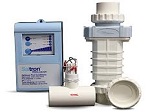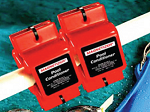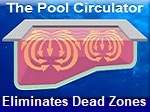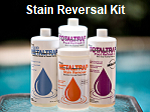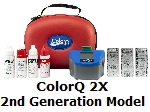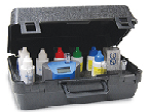| |
|
Scroll
down to browse through some archived SWIMMING POOL
questions and answers. Please click the Pool
Problems Link, on top of every page, to access a complete
listing of Pool Problem subjects, an alphabetized
Website Table of Contents, Pool Equipment Information,
About Alan Biographic Material and a Pool Glossary. Use
the other links to access additional subject
information. More information about some new and unique
products, for pools and spas, can be found by visiting
The Website Store.
You'll never know what you'll find and that's always
fun. Be better prepared and avoid costly problems!
|
|
 |
Shipping is FREE* . . . within
the Continental U.S.
A $9.99
handling charge will apply
to Continental U.S. Orders,
under $75.00. Orders
outside of the Continental
U.S. may require some
additional charge, based on
quantity and destination.
Most products can be
shipped World-Wide. International
and orders outside of
Continental U.S. - see
comments on the ordering
pages. |
|
 |

Major
Credit Cards and PayPal are accepted. |
|
On-line
shopping since 2002 - Safe and Secure!!! |
|
Protecting a heater and improving
performance!!! |
|
Incorrect
use of a sanitizer can result in heater
corrosion.
Salt Chlorine generators
tend to create higher pH conditions,
which are not likely to cause corrosion.
A Chlorine
is the most popular pool water
sanitizer and sanitizing is a must, for proper pool
water management.
Salt Chlorine generators are a
better way to utilize chlorine, producing
more controllable results. They
eliminate the need to handle, measure or
store chlorine products, while reducing
buildup problems. An
Electronic
PockeTester Kit is a convenient
way to monitor the salt level.
|
|
Salt Chlorine Generators - 3 models |
Testing The Salt Level |
Salt Chlorine Generator - No
Installation |
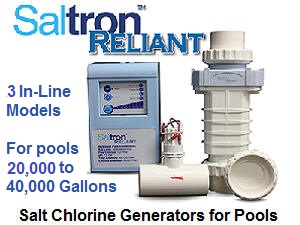 |
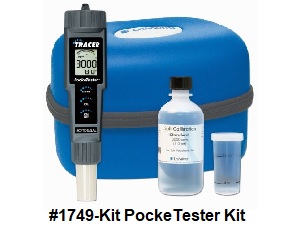 |
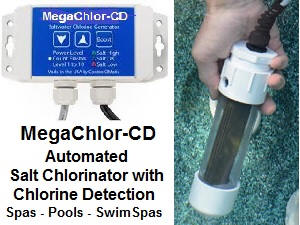 |
|
Product and Ordering Information |
Product and Ordering Information |
Product and Ordering Information |
If you have a pool or spa water
testing need, we should have the
product.
►
Scroll down to read through some
Question & Answer information.
◄
|
|
A
ColorQ 2X is a 2nd generation,
Bluetooth, Waterproof, all-digital tester,
that can
measure all the common test factors. There is a model, for every sanitizing
need.
The Circulator is a
replacement return jet fitting,
that dramatically improves
circulation, by creating a
spiral return flow. Better
circulation helps sanitizers
and heaters work more effectively. The
WaterLink SpinTouch Labs
are the ultimate tester, doing
up to 10 different water test
factors, in just 1 minute.
Voted product of the year. |
|
ColorQ All-Digital Water Testers |
Circulation Boosting Return Jet
Fittings |
WaterLink SpinTouch Labs |
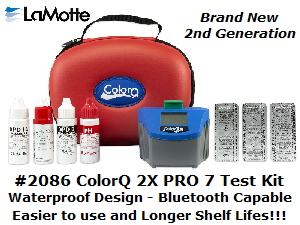 |
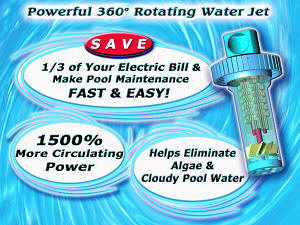 |
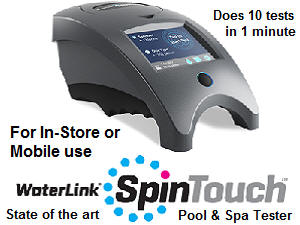 |
|
Product and Ordering Information |
Product and Ordering Information |
Product and Ordering Information |
If you have a pool or spa water
testing need, we should have the
product.
►
Scroll down to read through some
Question & Answer information.
◄
|
|
|
How to solve heater problems and select
the right options? |
Pool heaters
represent a considerable investment and must be properly protected from the negatives effects of
corrosion and poor water chemistry. Improper
installation of a chemical feeder can lead to
heater damage. Deposits of scale, due to
excessive calcium hardness or poor water
chemistry, can reduce the efficiency of the
heater, by lining the heat exchanger with scale
deposits. There are several types of pool
heating systems available including: fossil
fueled heaters, electric heat pumps and solar
heating systems. Individual pool circumstances
can dictate the system's requirements and point
to a best choice. Operating costs and
environmental considerations should be factored
into the selection process, as only solar
heating systems are virtually cost-free and
pollution-free. If problems arise, refer
to the Pool
Problems Page, as a source of
problem-solving information, broken down into
various categories. Scroll down the page
and click on the linked
keywords,
catch phrases
or images, in the archived answers below, to access additional information, on that topic or product.
 |
Join our E-Letter Mailing List.
You'll receive 1-3 E-Letters a
month, featuring helpful pool
and spa advice, new product
information and sale
announcements. All we
require is your e-mail address
and you can opt out anytime you
wish.
Your information
will never be shared or sold. |
|
▼
Helpful,
Problem-Solving Information, in a question and
answer format.
▼ |
►
Time To Move On To Something More Efficient?
We have
in in-ground pool and spa built in 1969 that
came with the house. We just replaced the
filter and now the heater seems to make loud
"knocking" noises. Do we have to get a new
heater? Is there any other alternative or
less expensive way to approach this?
Barbara B., 10/23/2017
It sounds like this heater is on its last
legs. By today's standards, that heater is a
gas guzzler. Time to move on to better
efficiency. You have
two basic choices: a fossil fuel heater or a
heat pump. A heat pump would be the smart
choice. It is very likely that a heat
pump will be less expensive to operate.
You should be able to confirm this with the
contractor, as he should have the
comparative costs of electricity and natural
gas or propane. Heat pumps cannot operate
effectively below a certain point. Your
weather may be a factor, but I suspect that
your time frame will work for the heat pump
and that it will be more economical.
Most likely, if it is too cold to operate a
heat pump efficiently, it will be too cold
to swim comfortably. I hope that I
have been helpful. If so, please tell your
friends and dealers about the website.
Sincerely. Alan Schuster, 10/23/2017
► Heater Operating
Costs?
Living in the Daytona area of Florida,
I just had an inground fiberglass pool installed and love
it. I'm wondering about how much a year it would cost to run
a natural gas heater. It is a 12' x 28' X 4.5 ft. deep pool.
Thank you for any info or suggestions.
Christopher R., Florida, 9/28/2018
I don't have access to that type of information. You should
direct the question to the local gas supplier or a gas
heater contractor. In addition to the cost of natural gas
and where, in the country, you are located the individual
factors of pool exposure, desired water temperature and
whether or not a cover will be used have to be considered.
An automatic safety cover
can reduce heater costs by up to 70%. A gas heater may not
be the most economical - check into a heat pump. Heating costs can be reduced or controlled
by employing a pool automation device. Want a FREE source of
heat? A solar pool heating system can run off your existing
filtration system pump and can raise the water temperature. Good luck and I hope that I have been helpful.
Sincerely. Alan Schuster, 9/28/2018
► Choosing The Right
Heat Pump?
I had an inground pool installed last
year and will be looking to install a heater, in the spring.
I did some checking and came to the conclusion that a heat
pump will be more economical to operate than gas or propane
heaters. What should I look for in a heat pump? Thanks.
John H., Columbia, MD, 11/22/2017
There are a few important factors to consider, when
evaluating for heat pumps. COP or Co-efficiency
Of Performance is similar to an Air Conditioner's SEER
rating. Above 5.0 is good efficiency. Above 5.8 is very good
efficiency. Heat Exchanger Design is another important
factor. While most inexpensive heat pumps use a copper heat
exchanger, it is prone to damage from improper water
chemistry or incorrect chemical treatment. This is, usually,
not covered under a warranty. A single row of
evaporators, versus dual row evaporators, are not as
efficient. The more rows of refrigerant, flowing through the
evaporator, the more heat it can collect from the air, which
leads to a more efficient design. I hope that this
information will help you make the best selection.
Sincerely. Alan Schuster, 11/22/2017
► Where
Should A Heat Pump or Heater Go?
We have an inground pool with an
chlorinator (uses 7 oz. tablets) and a DE filter. The
chlorinator is hooked in, just after the filter. We are
planning to add an electric heat pump and are having a
dispute as to where it should go. Can you explain the proper
heater placement and settle the dispute. Feuding in
Virginia.
Marty B., Chesepeake, VA, 6/25/2018
There's nothing to argue about! Put the chlorinator after
the heat pump or you could destroy
the copper heat exchanger (Not all heat exchangers are made
of copper). The chlorinator must be last in line. The
chlorine, in the chlorinator, is acidic in nature and could
damage a copper heater core, if placed before the heat pump
or heater.
Placement of the chlorinator at the end will result in warm
water passing through the unit. You may have to periodically
adjust the settings on the chlorinator, in order to match
the rate of chlorine addition with the weather and pool
usage. This is easier than replacing the heater! I
personally know of someone, that had a heater installed by a
plumber (unfamiliar with pools) and he installed it after
the chlorinator: the heater did not last the season! You
should be able to confirm this, by referring to the heater
manufacturer's installation instructions. And don't forget a
check valve between the heat pump and the chlorinator. Enjoy the
warm water.
Sincerely. Alan Schuster, 6/25/2018
► Heat Pump
Practicality?
I am looking into adding a heater to
my inground pool. I see a lot of material concerning heat
pumps. Are they really practical for pools. I live in Vero
Beach, Florida. Thank you.
Barbara F., Vero Beach, FL, 8/13/2011
As a matter of fact, heat pumps are very practical,
especially in the sunbelt. In your location it should work
out very well. There is a practical, if not physical limit,
as to how much a heat pump can do in terms of raising the
temperature. Check to see what that limit is and, consider,
if you want to use the pool all year. It wouldn't be
practical for year round use in New York, for example. In
New York, it performs very well during the normal season and
would be well suited towards extending both ends of the
typical swimming season. In your area, it should be able to
perform virtually all year. But, check it out to make sure
before committing to a purchase. If you are interested in
reducing operating costs, you might consider using a pool
safety cover. These cover reduce evaporation, keep the heat
in and provide safety for animals and kids. Good luck and I
hope that I was helpful.
Sincerely. Alan Schuster,
8/13/2011
► Ryznar
Stability Index?
What is the Ryznar Stability Index and
is it calculated? How does it help protect
heaters and other equipment, from corrosion pool water
conditions?
Paul A, Tempe, AZ, 4/1/2012
The Ryznar Stability Index
is favored, by some heater and equipment manufacturers,
because it affords greater protection against corrosive
water, than does the more familiar
Langelier or Saturation Index.
The Ryznar Index favors higher calcium hardness levels
and/or higher pH levels. This can reduce the possible the
corrosive effects of softer, lower pH water. However,
there is a negative side. Following this index boosts
the calcium hardness to a point, where calcium scale can
begin to form. While this actually helps protect the
equipment, from corrosion, as scale forms in the heater, it
reduces the efficiency, by acting as an insulator. The
scaling tendencies act to cement the filter media, reducing
the effectiveness of the filter. In parts of the southwest
and elsewhere,, the water is already too hard, right out of
the tap and it is challenging to main a clear pool, without
excessive scaling. I
hope that this information will help you decide about the
utility of this new Index.
Sincerely. Alan Schuster 4/1/2012
► Reliance On
Solar Heating?
Alan, We are thinking of having a
fiberglass inground pool, small sized, installed. However,
the last inground pool we had in Lakeland Fl was cold year
round. We had no heater. We now live in Sarasota, Fl and
would like to have solar heat with the new pool. How warm
can we expect the water to be in the fall. Right now our
daily temps have been in the mid 80's. We would like to use
the pool year round. Thank you.
Jeannie C., Sarasota, Florida, 10/17/2011
The thing about solar is that it works best, when you need
it least. With good Sun exposure, it should raise the
temperature, by 7-10 degrees. Once the Sun goes down,
evaporational cooling will cause the temperature to drop.
However, if you use Solar Heating, in conjunction with a
Solar Blanket, you will minimize the overnight heat loss.
The water temperature will rise a bit each day, until an
equilibrium point is reached, based on ambient temperature
and availability of Sun. I would expect you to reach a
comfortable temperature, for all but the very coldest
periods, by combining a solar heating system and a solar
blanket. I hope that this information will get you into some
warmer water.
Sincerely. Alan Schuster, 10/17/2011
► Efficiency
Concerns?
What is the most efficient way to run
a pool heater in South Florida? Is it more economical to
turn off the heater at night? Or should it be simply lowered
or kept at the temperature for swimming. Also what is the
recommended temperature to heat a pool? We can't agree. I
like it at 87 to 90. He likes it at 82 to 84. We do not have
a solar/pool blanket. Would this help by keeping the
temperature up? Also how long does it take to heat up the
water. if it's turned off every night w/o a pool blanket? If
we do get a solar pool blanket, how can it easily be taken
on & off? Thanks.
Bev, Florida, 12/22/2008
Lots of questions. Unfortunately, they all don't have
answers. Most heaters and filtering systems are not run
24/7. Heating the water for the overnight period, only
increases the heat loss. I would shut the heater down prior
to the last use of the pool and start the cycle again, a few
hours prior to the first use of the day. The later in the
morning - the better. You might as well have the Sun on your
side. Temperature is an individual matter. It is what you
like! Maybe even what he likes. Why not compromise on 85°F?
A solar blanket will positively reduce heating costs. How
long it takes to raise the water 1° will depend upon the
heater type, size, water temperature, Sun exposure, wind,
etc. Your heater instruction manual might provide the
information. The water will heat up quicker with a solar
blanket on. A roller system helps make a solar blanket less
unwieldy. The easiest way to cover a pool is with an
automatic pool cover.
It can be done at the push of a button. I
hope that the information proves helpful.
Sincerely. Alan Schuster, 12/22/2008
►
Do-It-Yourself In-Ground Solar Heating?
We are interested in installing a
Do-It-Yourself Solar Heating system for our 16 X 30 inground
pool but do not have a lot of money to spend. Someone told
me that we can install a system ourselves by using black
tubing and running it around the roof. Do you have any
instructions on how we can do this?
Brenda G., 5/3/2005
In theory, if you ran the line from the filter through a
length of black pipe, exposed to Sunlight, it would pick up
heat. Just running pipe around the roof will not create
enough surface area to make a meaningful difference. Solar
heater do not just use black pipe - they use thin cells to
increase the surface area, making heat exchange meaningful
and efficient. Doing what you are suggesting will cause you
to spend money without much of a return benefit. That
doesn't mean that you can do-it-yourself. Many
solar pool heaters can be installed easily, by a
homeowner. It utilizes the same pool pump and requires no
extra electricity to operate. The heat produced really is
free! Enjoy the season and I hope that I have been helpful.
Sincerely. Alan Schuster, 5/3/2005
► Solar
Heating Alternatives?
What a great website! I live on Long
Island and we just got a brand new inground pool (16x34). Do
have any info on Solar Sun Rings for heating an inground
pool? Do they work? Do they work better than a regular solar
cover? Thanks so much.
Melissa H., long Island, NY, 6/2/2007
Solar rings help, but not as much as a solar cover that
fully covers the surface. Evaporation is the main source of
heat loss and a full-sized solar cover will work better.
However, the rings are a lot easier to handle. Better yet,
would be a solar heater. There are several models, that you
can easily install yourself. Unlike fossil fuel heaters,
sunshine is free! The Solar Heating Systems do not require
an additional pump or add to your pool's electrical usage
bill. I hope that you will find this information helpful.
Sincerely. Alan Schuster, 6/2/2007
► Heater
Economics?
It seems like a Heat-pump type water
heater or the salt generator unit, we were thinking of, for
an inground system is not so useful for an above ground
pool. The cost of the additional systems is way more than
the pool itself. Are they worth it?
Martin P., 2/22/2013
It would be difficult to justify spending more on the heat
pump, than on the above ground pool. Heat pumps are very
efficient, but h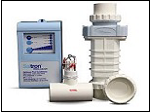 ow much is warm water worth? In addition to
the purchase cost, there is still the electrical expense.
Why not consider solar heating? The initial cost can be very
modest and, thereafter, it's free! Used in conjunction with
a solar blanket, it can really make a big difference,
depending upon your location and the sunshine level. A
salt
chlorination system will help offset the initial cost, by
reducing the amount of chemicals needed to maintain proper
pool water quality. Salt chlorinators are convenient and
will help keep your pool water in better balance, with less
effort. Both products will make your pool ownership
experience more enjoyable! I hope that the information
provided will prove helpful. ow much is warm water worth? In addition to
the purchase cost, there is still the electrical expense.
Why not consider solar heating? The initial cost can be very
modest and, thereafter, it's free! Used in conjunction with
a solar blanket, it can really make a big difference,
depending upon your location and the sunshine level. A
salt
chlorination system will help offset the initial cost, by
reducing the amount of chemicals needed to maintain proper
pool water quality. Salt chlorinators are convenient and
will help keep your pool water in better balance, with less
effort. Both products will make your pool ownership
experience more enjoyable! I hope that the information
provided will prove helpful.
Sincerely. Alan Schuster, 2/22/2013
► Propane Or
Natural Gas?
Your website is very helpful, thank
you for making it available. We are in Canada and purchasing
a 18'x32' inground straight back kidney pool and I have a
few unanswered questions: Which type of Pool Heater is more
efficient? Propane or Natural Gas? Pros and Cons on each?
Should we get a bottom drain in our pool? Thank you very
much.
Debbie, Canada, 5/16/2006
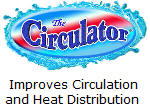
Natural gas should be more convenient. Other than the major
consideration would be the operating costs and that will
depend on local energy
costs. Discuss this with the gas and propane suppliers. You
left out another good choice: a heat
pump. It operates on electricity and is both clean and
convenient. Again, local energy costs needs to be discussed
with the contractor or utility. Adding an
automatic pool
safety cover can make a huge difference in heating costs. A
bottom drain will certainly help you keep the pool cleaner
and will help to distribute the heat more effectively. With
or without a main drain, The
Pool Circulator is an effective way to increase circulation.
It simply replaces an ordinary return-jet fitting. I
hope that this information will prove helpful.
Sincerely. Alan Schuster, 5/16/2006
► Heater
Longevity?
Alan, I like your site. Can you tell
me if there is a rule of thumb for how long a pool heater
should last? I have a unit that is about 13 years old.
Thanks!
Mike, 3/29/2012
I doubt that there is such a thing as a rule of thumb for
heater longevity. Some heaters are destroyed by improper
chemical maintenance and don't last a season. Others can
grow old gracefully, if proper conditions and maintenance
are maintained. Heater efficiency is another matter! Are you
getting the best value for the money being spent? I really
can't answer the questions with any specifics and suggest
that you discuss the matter with a heater contractor or your
local fuel supplier. Have you ever considered a Heat Pump? They are
efficient, quiet and the heater exchanger is made of
titanium, for better corrosion resistance and longer life. I hope that the information
proves helpful.
Sincerely. Alan Schuster, 3/29/2012
► The Solar
Heating Option?
I live in sunny Yuma AZ. I am in the
process of buying an in ground pool, 14,000 gallons. How I
can heat my pool using the sun's energy?
Jim S., Yuma, AZ 4/26/2008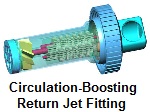
There are few places, in the U.S., better suited for solar
heating. All that Sun! A Solar Heating System that would be
perfect. It even uses the existing pool pump, so there is no
additional electrical cost involved. Adding
The Pool Circulator
is an inexpensive accessory, that will help to better
distribute the heat and make the temperature more uniform,
by eliminating dead zones. I hope that this helps keep you
in warm water.
Sincerely. Alan Schuster, 4/26/2008
► The Heater
Died?
I have a heater which is just about 8
months old and has died!. The manufacturer is refusing to
cover it saying the chemicals were off, causing corrosion on
the heat exchanger. The chemicals have run just about the
same, since prior to the heater being installed and the
installer did not check the water chemicals prior to
installation. People are telling me that there should have
been an anti corrosion check valve installed. However, the
manufacturer is saying it doesn't need one. Almost every
other heater, I have checked with, does suggest, if not
require one. Is there any information you can help me with?
Marcia P., 1/30/2008
I don't know if this particular heater requires a check
valve. Unless you are using a trichlor feeder, placed after
the heater, the check valve should not be an issue. The
feeder should never be placed before the heater, under any
circumstances. Trichlor is acidic and acidic conditions,
with chlorine present, will lead to copper corrosion. I have
no way of knowing if you subjected the heater to the
corrosive conditions, that lead to the heater
failure. However, if was the cause of the problem,
there should be copper present, in the pool water. Have the
water tested for copper. If present, corrosion is very
likely the cause of the problem. No copper, could mean that
the problem is not due to corrosion. Could a check valve
have prevented this problem? I don't know if this heater is
different, but a check valve makes sense, in most
installations. If you have to replace the heater, think
about something better. A Heat Pump will be more economical
to operate and may come with a corrosion-resistant,
titanium heat exchanger. Adding The
Pool Circulator
helps to better distribute the heat, by dramatically
improving the circulation. Watch the demonstrative video and
see how it works! I hope that this information will be
helpful. valve should not be an issue. The
feeder should never be placed before the heater, under any
circumstances. Trichlor is acidic and acidic conditions,
with chlorine present, will lead to copper corrosion. I have
no way of knowing if you subjected the heater to the
corrosive conditions, that lead to the heater
failure. However, if was the cause of the problem,
there should be copper present, in the pool water. Have the
water tested for copper. If present, corrosion is very
likely the cause of the problem. No copper, could mean that
the problem is not due to corrosion. Could a check valve
have prevented this problem? I don't know if this heater is
different, but a check valve makes sense, in most
installations. If you have to replace the heater, think
about something better. A Heat Pump will be more economical
to operate and may come with a corrosion-resistant,
titanium heat exchanger. Adding The
Pool Circulator
helps to better distribute the heat, by dramatically
improving the circulation. Watch the demonstrative video and
see how it works! I hope that this information will be
helpful.
Sincerely. Alan Schuster, 1/30/2008
► Tablets In
The Skimmer?
Just had an inground pool installed
with a heater. We were given a "start up" package of
Stabilized quick tabs (dissolve in 15 minutes, providing 59%
of available chlorine) and was told by installer that we
should use only these tabs daily and place directly in
skimmer because of the heater. I have seen on your site
that the slow-dissolving tabs should not be placed in
skimmer, but I wondered what other effective chlorinating
options I have? Is a chlorinator the way to go, installed
after the heater, or are these quick tabs just as effective?
Thanks.
Chris, 6/2/2005
The product that you are referring to is not slow-dissolving
trichlor. It is a blend of trichlor and soda ash. This
results in a
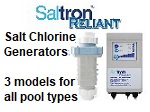 fast dissolving tablet that is relatively
neutral. Placing this type of tablet, in the skimmer, will
not have the same negative impact on the copper heat
exchanger. However, if the pool turns acidic, it will have a
corrosive effect on the heater. Adding chlorine through the
skimmer is never the best way to add chlorine. This type of
tablet cannot be used in a built-in chlorinator. Placing
these tablets in an enclosed chlorinator could result in a
explosion! Only trichlor tablets can be used in an enclosed
chlorinator. If you want to use an inline chlorinator, you
must use trichlor tablets or sticks. The chlorinator should
be last in line, after the heater, and must be installed
according to the manufacturer's instructions. You really
should consider the benefits of a
salt chlorine
generator, as it will provide better control of the
chlorine level and better results. In addition, it
helps avoid corrosive acidic conditions, as the pH is
unlikely to drop too low, unless you add too much acid. I hope that I
have been helpful. fast dissolving tablet that is relatively
neutral. Placing this type of tablet, in the skimmer, will
not have the same negative impact on the copper heat
exchanger. However, if the pool turns acidic, it will have a
corrosive effect on the heater. Adding chlorine through the
skimmer is never the best way to add chlorine. This type of
tablet cannot be used in a built-in chlorinator. Placing
these tablets in an enclosed chlorinator could result in a
explosion! Only trichlor tablets can be used in an enclosed
chlorinator. If you want to use an inline chlorinator, you
must use trichlor tablets or sticks. The chlorinator should
be last in line, after the heater, and must be installed
according to the manufacturer's instructions. You really
should consider the benefits of a
salt chlorine
generator, as it will provide better control of the
chlorine level and better results. In addition, it
helps avoid corrosive acidic conditions, as the pH is
unlikely to drop too low, unless you add too much acid. I hope that I
have been helpful.
Sincerely. Alan Schuster, 6/2/2005
► pH And
Copper Corrosion?
Recently after a new replaster job, it
was necessary for the pool contractor to give the finish an
acid wash. We turned off our equipment and they added large
doses of Acid that cleaned the pebble plaster. The pool
people returned a second time and added more acid to finish
a few places. After about a week total time they returned
the third time and added a bag or so of Soda Ash to raise
the pH? (counter act the acid) At this time we started the
pumps and ran it for a good 6 hours. Then it ran for the
next three days as per normal schedule which is about 4
hours a day. My normal pool person informed me on the
fourth day that the acid level was still Very high, well
above normal and asked if the acid wash folks had attempted
to lower the acid level. I informed him of what had
transpired and he mentioned that a very high acid level
could damage the heater. This is a brand new heater that
the contractors also installed. I am hesitant about putting
the pumps on at this time and I have sodium bicarbonate in
the pool to lower the pH. A recent check of pH and Chlorine
shows continued HIGH pH and NO chlorine. I did read a
question on your site regarding a similar instance and you
mentioned, for damage to happen to the core of the heater,
chlorine or bromine would need to be present. Along with
the new remodel we had a salt system that has been working
great and providing the chlorine. However, after several
days of no chlorine making, the chlorine level is obviously
zero. Should I feel safe to turn the pumps on and turn the
chlorinator off so I can circulate the sodium bicarbonate
within the pool and lower the pH? Thanks.
Mark P., Irvine, CA, 2/23/2005
If the heater core is made of copper or copper alloy, it
could be damaged by the presence of chlorine and the
maintaining of low pH conditions. Keeping the pH in the
normal 7.2-7.6 range will prevent corrosion of copper
parts. Either you are stating the chemical names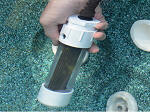 incorrectly or you are wasting your time. Sodium bicarbonate
will not lower your pH. It will raise the total alkalinity
and move the pH slightly towards 8.0. If your pH is too
high, you must add acid. Salt chlorine generators can tend
to raise the pH or too much soda ash might have been added.
What you need is acid to optimize the pH! Before you turn on
the chlorinator, I suggest that you add a double dose of a
quality metal treatment, such as phosphate-free
Liquid
METALTRAP, in order to help prevent staining, due to metals
in the source water of copper corrosion that might have
occurred. I would add another dose monthly or whenever new
water is added. At the very least it will help keep the
salt
chlorine generator electrode plates cleaner. Wait a few
hours before turning on the chlorinator. I doubt that any
harm was done to the heater. I hope that I have been
helpful.
incorrectly or you are wasting your time. Sodium bicarbonate
will not lower your pH. It will raise the total alkalinity
and move the pH slightly towards 8.0. If your pH is too
high, you must add acid. Salt chlorine generators can tend
to raise the pH or too much soda ash might have been added.
What you need is acid to optimize the pH! Before you turn on
the chlorinator, I suggest that you add a double dose of a
quality metal treatment, such as phosphate-free
Liquid
METALTRAP, in order to help prevent staining, due to metals
in the source water of copper corrosion that might have
occurred. I would add another dose monthly or whenever new
water is added. At the very least it will help keep the
salt
chlorine generator electrode plates cleaner. Wait a few
hours before turning on the chlorinator. I doubt that any
harm was done to the heater. I hope that I have been
helpful.
Sincerely. Alan Schuster, 2/23/2005
►
Heater With Something
Other Than Copper?
I recently destroyed my pool heater,
as a result of corrosion. I was putting the 7 oz. tablets in
the skimmer and it seems that the copper was corroded by the
chlorine. I am not sure that I want to risk another heater.
How can I avoid risking a repeat? It was an expensive
lesson. Keeping my cool.
Irving S., Staten Island, NY, 8/2/2004
The copper heater core was not "corroded" by just the
chlorine. It takes the combination of low pH and chlorine to
subject copper to corrosion in a swimming pool. The practice
of adding trichlor tablets to the skimmer is not something
that I would ever recommend. Trichlor is very acidic and can
slowly lead to corrosive conditions, if the pH is not
properly maintained at 7.2-7.8. Installing an in-line
chlorinator, after the heater and last in line, is a better
way to add chlorine to the pool. There are heaters that
utilize materials other than copper in the heat exchanger.
Titanium and possibly stainless steel are used in some
heaters and Heat Pumps. These materials are less subject to corrosion.
However, for the comfort of bathers and protection of all
the metal underwater surfaces, you should maintain a proper
pH. Have you considered solar heating? In your part of the
country, solar heater panels can be used to extend the
season. Solar blankets can be used with all types of
heaters, not only to raise or maintain the water
temperature, but to reduce operating costs. I suggest that
you discuss heater options with a local pool professional,
so far as heater choices and cost considerations. Good luck
with your decision.
Sincerely. Alan Schuster, 8/2/2004
► Scale
Deposits In A Heater?
I read somewhere that very high
calcium hardness and pH can lead to scale formation and that
scale can form on the underwater surfaces, including in the
heater. My water has over 500 PPM of calcium hardness. I
have a solar heater. I don't see any real evidence of scale.
Every once in a while, I get cloudy water. Is there
something I can do to avoid a potential problem? Please
help.
J. M., 6/9/2007
A calcium hardness level of 500 PPM can definitely lead to
scale formation and it can take place in your solar heater
or any other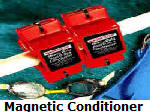 type for that matter. If so, it will reduce the
heater efficiency, by acting as a form of insulation. Make
sure that you keep the pH closer to 7.2, than to 7.6. Try
and lower the total alkalinity to within 80-120 PPM, if
practical. Stop all use of products containing calcium.
Add a quality Mineral Treatment, such as phosphate-free,
Liquid METALTRAP, in order to help sequester the calcium, on
a regular basis. This treatment can actually slowly dissolve
scale deposits, over a period of time. Adding a
Magnetic
Water Conditioner can help deal with scaling problems, as
well. There's nothing in your letter that positively
indicates that you have a problem, at this time. But, some
prevention does make sense. I hope that I have been helpful. type for that matter. If so, it will reduce the
heater efficiency, by acting as a form of insulation. Make
sure that you keep the pH closer to 7.2, than to 7.6. Try
and lower the total alkalinity to within 80-120 PPM, if
practical. Stop all use of products containing calcium.
Add a quality Mineral Treatment, such as phosphate-free,
Liquid METALTRAP, in order to help sequester the calcium, on
a regular basis. This treatment can actually slowly dissolve
scale deposits, over a period of time. Adding a
Magnetic
Water Conditioner can help deal with scaling problems, as
well. There's nothing in your letter that positively
indicates that you have a problem, at this time. But, some
prevention does make sense. I hope that I have been helpful.
Sincerely. Alan Schuster, 6/10/2007
► Check
Valve?
Should there be a check valve,
installed between the natural gas heater and a built-in
chlorinator? Why? The chlorinator is after the heater and is
last in line. Thanks.
Allen C., Toms River, NJ, 6/4/2005
Absolutely! When the pump is running the chlorinated water
is going into the pool. When the pump is off, there is a
possibility that water might back up from the chlorinator
into the heater. The water in the chlorinator can be quite
acidic, due to the nature of the trichlor tablets. If this
water gets into the copper heater core, it will cause
corrosion. Over time, the copper coils can be completely
destroyed. The installation of a check valve will help
prevent this from occurring. All or at least most of the
heater manufacturers recommend this type of device. I hope
that I have been helpful.
Sincerely. Alan Schuster, 6/4/2005
► Check Valve
Requirements?
Hi Alan, I have a gas heater and my
heat exchanger just went out a few weeks ago (green
corrosion). I replaced it. In case this was caused by
chlorine, I installed a check valve on the output between
the heater and my In-Line chlorinator. When I installed the
check valve. I was unable to install it per the
instructions. The instructions say you need 18 inches of up
flow after the check valve in order for the weight of the
water to keep the check valve closed. As you know, after the
water leaves the heater there is not normally an up flow (it
is all down flow from there). After 2 weeks of use, I pulled
the return header off and found the new one is turning green
on the inside. I had my water tested and everything was fine
except hardness it was a little high (600ppm). But, the tap
water in my area is pretty hard so I don't think there is
much I can do about that. I doubt the hardness would cause
the green corrosion anyway. So, my conclusion is maybe even
though the check valve is spring loaded, it may be allowing
the water to seep backwards due to there being a down flow.
The only solution I can figure out is, come out of the
heater and turn straight up for at least 18 inches. then
turn straight down to get to my chlorinator. I don't know if
18 inches of up flow would work followed by an immediate 30
inches of down flow (This seems it might cause it to
siphon). This does not seem like a good solution. I would
also consider changing out the chlorinator to an off-line
system, but I doubt that would help my situation. Do you
have any suggestions. Thanks so much.
Jamie L., 9/5/2010
The green corrosion is being used by low pH conditions in
the presence of chlorine. If your pool water has not been
acidic for extended periods of time, that leaves only the
check valve and the backflow from the chlorinator as the
possible causes of the problem. Your solution seems to be
workable. Any siphoning that might be created would direct
the water to the pool and that will protect the heater from
the corrosive backflow: the pool water being the lowest
point. The check valve manufacturer's recommendation makes
sense for their product and I suggest that you follow them.
I hope that I have been of some assistance.
Sincerely. Alan Schuster, 9/6/2010
► Copper
Corrosion?
After dealing successfully with
yellowish stains on the vinyl liner and rigid plastic parts,
we had our water chemistry just right except for a small
hardness deficit (but stable pH around 7.4 and alkalinity
around 110) and we were in business. Last week, we tired of
how cold it was and decided to turn on the three year old
heater.. Also this past week, since everything was OK with
the water, I set the timer to run the pump 18 hours/day
instead of non-stop. This past Saturday, I realized that the
temperature was falling at times because heater was not
running reliably and replaced a faulty pressure switch, and
this may have been the first time that the heater began to
cycle on and off normally. When mixing chemicals with water
to bring our hardness up on Saturday (or MAYBE it was when
mixing chlorine to shock; I’m not certain), I noted a brown
tinge to the water and thought little of it. By mid-day
Sunday, we realized that the yellowish-brown stains were
returning to the liner and the water was taking on a vague
aqua color. A water test at the pool company revealed copper
at 0.3 ppm and their suspicion is that poor water
maintenance by the previous owners (we just moved in this
Spring) caused heat exchanger damage. I know that the pH has
not been below 7.2 since a few weeks ago when I exchanged
most of the water to correct a high CYA, followed by
chelating agents to remove the severe staining that we
started with. The only thing I can’t prove is that no copper
was left behind from the prior treatment. My theory,
consistent with your advice elsewhere on your web site, is
that the lack of a check valve between the heater and
chlorine dispenser is to blame. (Plumbing is
skimmers-pump-DE filter-heater-trichlor dispenser-return.
The chlorinator is about a foot below the heat exchanger;
all equipment is at the deck level and therefore the filter
outlet and heat exchanger are about 2’ above the water
level.) The heater manufacturer's tech support is surprised
that the heater lasted three years without a check valve.
But the pool installer, one of the largest in the area, puts
all their heaters in this way without problems, says that
they had too much trouble with check valves, and insists
that poor water maintenance in the past is by far the most
likely culprit. We’ve never used any algaecides. My
question: If the copper heat exchanger had sustained damage
in the past from acidic water, could it still be putting
copper into pH 7.4 water? Assuming the pool company is
correct that relevant back-siphoning of dispenser contents
into the heater shouldn’t occur, is it more likely that
copper was left behind from the previous chelating
treatment? I did purge the filter as instructed after the
treatment.
Nameless, 6/17/2007
The copper could have come from the use, by the previous
owners, of products such as copper algaecides or
winterizing. It could have come from corrosion of the heater
exchanger, due to acidic conditions. It could have come from
there being no check valve. The water analysis doesn't prove
the source. If you chelate copper, it doesn't leave the
water. It can remain in the pool water indefinitely, in a
stable chelated form. If you have maintained a pH in the
ideal range, recent copper corrosion should not have
occurred, That is if there is a check valve! The heater
works, the pool problems are solved and it is time to enjoy
the pool. Concentrate on what is ahead and don't dwell on
the past. I hope that I have been helpful.
Sincerely. Alan Schuster, 6/17/2007
► Solar
Blanket Considerations?
I have two questions I hope you can
help me with. My first question is, can you leave a solar
blanket on a pool for a couple of days when you are not
going to be swimming? I have been told that this will cause
algae to grow. My second question is pertaining to turning
my heat pump off at night. In the day my water temperature
is 81 degrees in the evening I turn my pump to low speed
which means my heater turns off. The morning temperature of
my water is 77 degrees. Is it more economical to keep the
temperature at 81 or to reheat the pool 4 degrees? Regards.
John, Toronto, Canada, 5/22/2004
There's no reason that you can't leave the solar blanket in
place for periods of time. Just make sure that there are
proper levels of sanitizer or there is a greater possibility
of algae growth due to the warmer water. I once left it on
for a week and returned to 93°F and no signs of algae. The
warmer the water, the greater the difference between the
water and ambient overnight air temperature. In short, the
warmer pool has more heat to lose. It would be more
efficient to leave the heat pump off, with or without a
solar cover. Enjoy the season.
Sincerely. Alan Schuster, 5/22/2004
► Of Mice and
Heaters?
We live in Connecticut and have a
propane heater; obviously not used in the winter! This year
I have twice cleaned mice nests out of the heater. I read
that the heater is designed so mice do not go into it, but
that is clearly not working. Do you know of any product or
method of keeping them out? The nest was in an obvious
place, but I wonder if they made it in the heat exchanger or
something that would be a real problem. People used to use
moth balls to keep mice out of enclosed spaces, but I do not
know if the chemical in them would be corrosive to the
heater. I could put a product like a mice killer in there,
but for all I know that might just attract them. Any
thoughts or experience with this problem? Thanks!
Connecticut, 4/4/2007
Your question is too product specific and I am unable to
answer it, completely. I don't know what the inside of the
heater is like. I would direct the question to the
manufacturer. I have been recommending mothballs to repel
snakes, snails and frogs, from the outdoor pool area, for
some time now. You shouldn't have to add them to the heater
housing. Just place some around the perimeter of the
equipment. However, you will still have to worry about small
children or pets finding the mothballs. I hope that I have
been helpful.
Sincerely. Alan Schuster, 4/4/2007
|
Visit The Website Stores . . . for
better informed shopping!!! |
|
 |
Shipping is FREE* . . . within
the Continental U.S.
A $9.99
handling charge will apply
to Continental U.S. Orders,
under $75.00. Orders
outside of the Continental
U.S. may require some
additional charge, based on
quantity and destination.
Most products can be
shipped World-Wide. International
and orders outside of
Continental U.S. - see
comments on the ordering
pages. |
|
 |

Major
Credit Cards and PayPal are accepted. |
|
▲
Return To Top Of Page
▲
Aqualab Systems, LLC does not
make any warranty or
representation, either expressed
or implied, regarding the
accuracy or completeness of the
information provided by this
website; nor does Aqualab
Systems., LLC. assume any
liability of any kind whatsoever
related to, or resulting from,
any use or reliance on this
information. The content of this
website should not be used, if
it is conflict with any
applicable federal, state or
local regulations or guidelines.
© Aqualab Systems, LLC. All
rights reserved
|
|

















